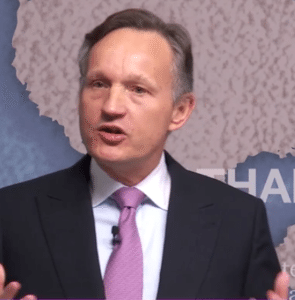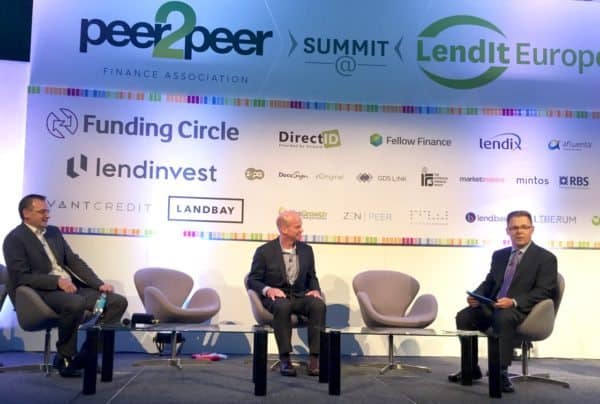Anthony Jenkins, is a former CEO of Barclay’s Group having managed the global firm from 2012 to 2015. He was sacked by John “Mack the Knife” McFarlane in the summer of 2015. Jenkins had set out to tackle a “culture of self-enrichment” and to refocus the bloated bank, but his tenure was cut short as McFarlane claimed the change was taking too long. Jenkins still holds strong opinions on the industry in which he has spent much of his life. He recently delivered a speech at the Chatham House (embedded below) where he reflected upon the rapid pace of technological change while raising a warning for high street banks. Disruption is at the door.
Technology moves rapidly. Jenkins reminded everyone how back in the day, mobile phones were like bricks, portable computers weighed 20 lbs, and fax machines were everywhere. Jump back to the future of 2015 and banking is queued up to be UBERized, or crushed by the efficiencies of the internet.
 Jenkins, is of the belief that the number of branches and people employed in the financial services sector may decline by as much as 50% over the next ten years. He believes the best-case scenario (depending on your point of view), will deliver a decline that tops out at “only” 20%. Still an incredible figure.
Jenkins, is of the belief that the number of branches and people employed in the financial services sector may decline by as much as 50% over the next ten years. He believes the best-case scenario (depending on your point of view), will deliver a decline that tops out at “only” 20%. Still an incredible figure.
TheCityUK puts the number of employees in finance in the UK at over 2.1 million. If you believe Jenkins prediction, there will be a lot of former bank employees looking for work as their services will no longer be needed. If we apply Jenkins prediction to Barclay’s Group alone, about 60,000 or so former colleagues may be seeking new jobs.
And how does Jenkins describe an UBER moment?
“Massive pressure on incumbent banks which will struggle to implement new technologies at the same pace as their rivals.”
Traditional banks cannot adapt and innovate as quickly as creative entrepreneurs. Jenkins pointed speech calmly outlined the challenges facing traditional banking and that some participants may not survive.
As explained by Jenkins, an agile startup is simply not burdened by legacy technology, a culture fearful of change, and a need to report quarterly numbers without terrifying shareholders. Large high street banks must automate their services. Or they will go away.
Jenkins draws a parallel to former global brands Nokia and Kodak. Two companies that revelled in their self-assured market dominance only to quickly whither and disappear, becoming roadkill struck by technology.
 According to the former executive, the Fintech industry may be led by peer to peer / marketplace lending platforms today, but this is just the beginning. Payments, trading, wealth management and more. It is all moving online.
According to the former executive, the Fintech industry may be led by peer to peer / marketplace lending platforms today, but this is just the beginning. Payments, trading, wealth management and more. It is all moving online.
Jenkins believes this is just “version 1.0” of the revolution at hand. “We are still waiting for truly transformative services”. But the tsunami is coming. Version 2.0 and 3.0 may be the one-two punch to level traditional banks.
In the future, new companies will deliver financial services at a fraction of the cost. Truly digital banks will be able to spend most of their resources on the development and deployment of technologies and won’t need to sustain a network of physical branches and offices, states Jenkins.
The risks to the new world of internet finance? A regulatory environment that makes certain the data is used appropriately and cyber security are both paramount. Consumers must trust the new financial world order. Regulators need to embrace and encourage change but appropriate rules and observation are required for a robust internet finance sector to evolve
Is the banking sector well prepared and has it embraced technology?
“Despite the appearance of change, the incumbents will need to undergo the transformation seen in many other parts of the economy.”
Jenkins quotes a study by McKinsey where technology will wipe out almost two-thirds of the sector’s earnings on many financial products. Retail lending by banks, may see their profits shrink by as much as sixty percent. While banks are trying to change, they struggle with the culture necessary to be successful in the new digital world. Most all banks have Apps and facilitate online banking, but Jenkins views this as superficial adjustments. These are not transformative services.
Incumbent banks must address three significant issues to survive, declared Jenkins.
- Boards must ask executives to take significant, calculated risk
- There shouldn’t be a technology strategy, but a strategy with technology at its core.
- Executives need to lead differently. In Jenkins’ experience, leaders become more risk averse the more senior they become. Doing the same thing a bit better is, in the long run, infinitely more risky than being bold today.
Values also play an important role. The long term and short term strategy needs to be combined with appropriate values to succeed. Reflecting on the financial crisis;
“Banks were too aggressive, too self-serving and too focused on the short-term … I have no doubt the financial industry will face a series of Uber moments.”
The scale of the financial industry means it is ripe for disruption. Secondly, the cost of new technologies will continue to decline. It will become easier for new entrants  to attack traditional banks. Thirdly, artificial intelligence (AI), will bring much more natural applications that will have huge implications for how we work. Finally, the incumbents are already under considerable pressure.
to attack traditional banks. Thirdly, artificial intelligence (AI), will bring much more natural applications that will have huge implications for how we work. Finally, the incumbents are already under considerable pressure.
“The incumbents risk ending up as mere capital providing utilities … only a few with have the courage and decisiveness to win in this new world.”
Is there Hope for Traditional Banks?
Jamie Dimon, the legendary banking executive famously noted in a recent annual report that “Silicon Valley is coming“, but it is difficult to see much change happening at one of the most respected banks in the world.
Karen Mills, former head of the Small Business Administration (SBA), who wrote an important paper on the dearth of capital available for SME’s, believes that we shouldn’t count banks out. Yet… Yes, they have access to capital and some capable people at the helm.
At a recent LendIt conference in London, one of the better presentations was between Cormac Leech and one of Jenkins’ former co-workers, Matt Hammerstein. The debate posed the question; Will P2P Lending Take Over Banking? Hammerstein, as one would expect, explained it would not. Barclays is already allowing customers to access credit in minutes instead of weeks. Leech, of Liberum Capital and a former analyst for many banks, sees a future where banks simply cannot adapt. A cocktail of risk aversion and institutional inertia will be the death-knell.
While it may be too early to say all traditional banks will go away, if you are a shareholder in a high street bank, it may be wise to consider rebalancing your portfolio. Just listen to what Anthony Jenkins has to say.
Antony Jenkins sets out how technology will transform the way financial services are delivered and used.
Lendit Europe: Will P2P Lending Take Over Banking




